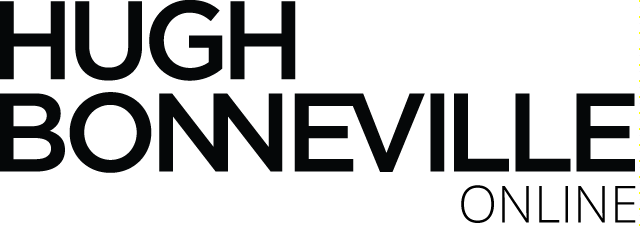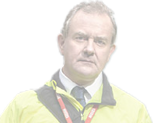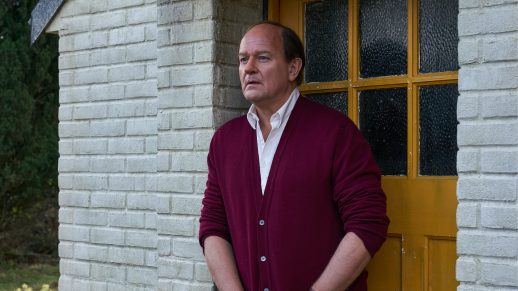Excerpts from an article by James Rampton
Hugh Bonneville has decided to roll up his own sleeves. Last week, he was photographed wearing a mask, a hi-vis jacket and a cowboy hat in his new job as a volunteer vaccinator in Midhurst, West Sussex. The tabloid headlines neatly summed up his surprise new role: “It’s Downton Jabbey!”
“As soon as Midhurst said, ‘We’re looking for volunteers at our vaccination centre’, I said, ‘I’m in!’” recalls Bonneville. “I’m secretly very excited. I get to wear hi-vis and point at people!”
The organisers, he adds, felt that people would be reassured to see a famous face. “But I replied, ‘Well, they won’t know it’s me because I’m wearing a flipping mask.’ That’s the whole pleasure of it. I’ll be completely anonymous and can say, ‘Oi, Grandad, get back in line’. For years in my profile for Who’s Who, I put that my favourite pastime was ‘watching jobsworths in their natural habitat’. And now I get to be one! It’s almost like being a BBC commissionaire, getting people stuck in revolving doors.”
Of course, he’s not just in it for the hi-vis jacket. “I’m a big fan of Jonathan Van-Tam, the deputy chief medical officer,” he says. “He was very clear that the single biggest factor in helping to end the pandemic is getting people who have doubts to trust the vaccine. It’s not just for you personally, it’s for everyone around you. That collective point needs to be communicated.”
Bonneville makes for enormously entertaining company – which is no surprise given the utter joy he brings to films like Paddington and the wry charm he exudes in Twenty Twelve. Having read theology at Cambridge, he attended the Webber Douglas Academy of Dramatic Art. After a small role as an air warfare officer opposite Bond, James Bond, in Tomorrow Never Dies, the actor became a mainstay of British TV and cinema: in Notting Hill, as Hugh Grant’s hapless friend Bernie; as the wealthy Mr Rushworth in Mansfield Park; and as Iris Murdoch’s husband in the Oscar-winning Iris.
We return to the issue of vaccination. Remarkably, the subject features in Bonneville’s latest project. To Olivia, a moving new film that premieres on Sky Cinema on Friday, recounts a true story. Written and directed by John Hay, who was previously responsible for the Bafta and Emmy-winning Stig of the Dump, it is an elegiac account of the sudden death from measles of six-year-old Olivia – the daughter of author Roald Dahl (Bonneville) and his wife, Hollywood star Patricia Neal (Keeley Hawes). Her death renders Dahl “limp with despair” – to the extent that he cannot bring himself to utter her name. He lies in the fetal position, catatonic with grief, unable to react even when the kitchen is burning down.
Bonneville, who has been married to Lulu Williams for 23 years and has one son, is struck by the unforeseen prescience of the film. Its timeliness, he says, brings “great potency to the idea of not having a vaccine”. Even though To Olivia was completed before the pandemic began, “that theme of vaccination is there underlying it. The fact that Roald and Pat became vocal supporters of the vaccination programme for measles has an extraordinary resonance now. The film emphasises the importance of it and how Olivia’s life would have been saved, had a usable or reliable vaccine been available.”
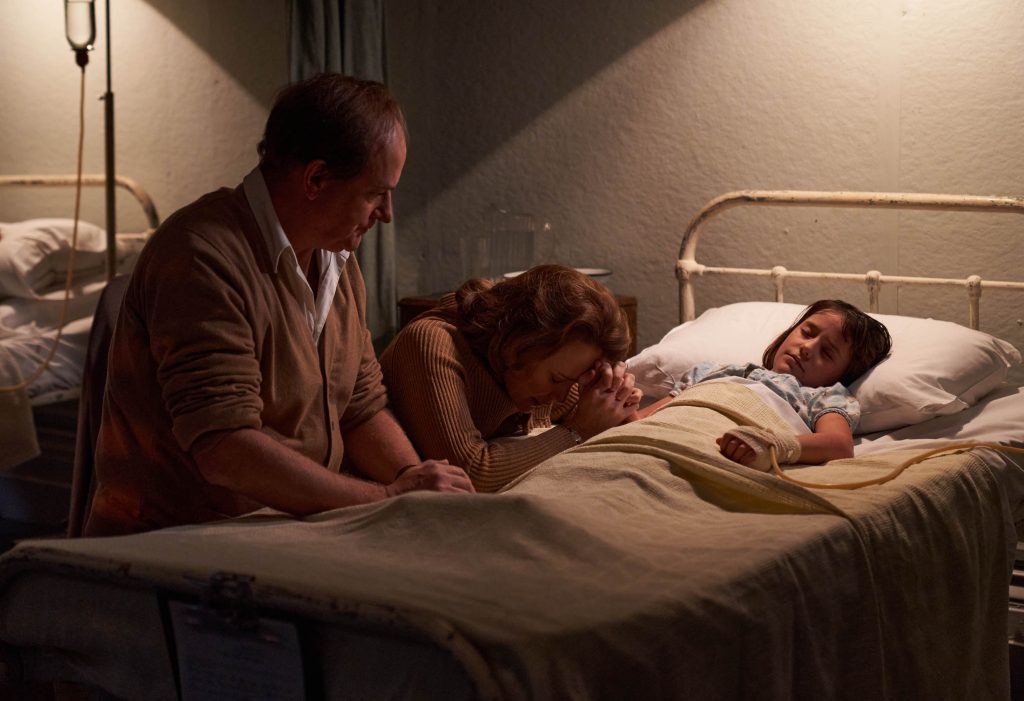
Roald Dahl (Hugh Bonneville), Patricia Neal (Keeley Hawes) and Olivia Dahl (Darcey Ewart) (Photo: Sky)
The film’s central theme of grief also held a very personal significance for Bonneville. “I certainly felt it very potently when I was doing it. I lost my brother very suddenly a couple of years ago, and both parents in the last five years, my dad just before Covid hit. I thank my stars that he didn’t have to go through the Covid experience in a care home.”
Grief, he says, is a fickle thing. “As anyone who’s been through it knows, it comes in waves. The thing that is so unpredictable and weird about grief is that one day you can have a memory about someone, and you’ll laugh your head off. And then a day later, the same memory will pop into your head, and you’ll burst into tears. It’s these waves of emotion that ebb and flow.”
A close friend of Bonneville’s once wrote to him about her own experience of grief. “She said there are these waves that feel like they’re crashing in all the time. You think, ‘No, this tsunami of loss that’s hitting me will never go away.’ But she was right. They gradually recede, and you’re left with these ripples that will always be there. Time never removes, but time heals. The wound will leave a scar of some sort, and of course, when you go through grief again, it inevitably reopens.”
To Olivia is deeply affecting. Did Bonneville take the film home with him? “No, I didn’t feel I was coming home in a vale of tears. But nevertheless, I think the deftness and the honesty of the writing and the stages of grief that this couple go through are very, very recognisable. Having experienced grief, I felt very connected to it.”
As a way of dealing with Olivia’s death, Dahl and Neal both lose themselves in creativity. In an astounding burst of imaginative energy after their daughter has passed away, Dahl writes Charlie and the Chocolate Factory, his first global bestseller, and Neal wins an Oscar for her starring role opposite Paul Newman (Sam Heughan) in Hud. “If any good did come out of this pain and grief,” muses Bonneville, “there was a positive, creative energy that they both shared. That escape into the imagination is completely understandable.”
But, he hastens to add, “this is not a date movie. Unfortunately, there are a few people online who I’ve noticed saying, ‘Oh, I can’t wait to show the kids that new Roald Dahl film.’ It’s not that…”
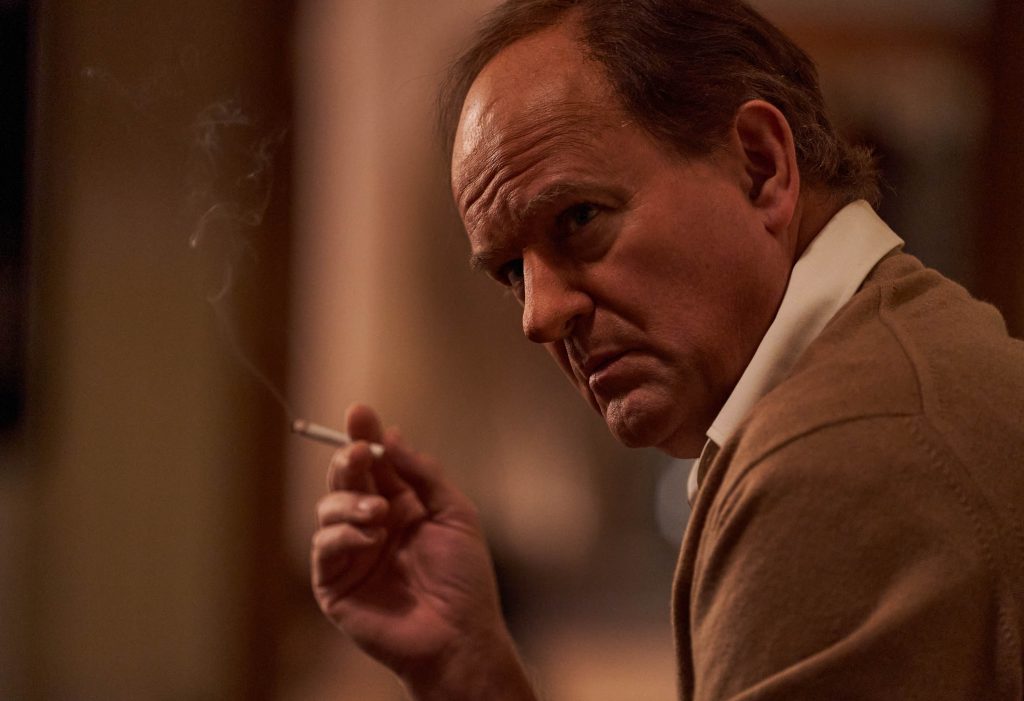
Hugh Bonneville as Roald Dahl (Photo: Sky)
The film does not sanitise the character of Dahl. It portrays an already difficult, cantankerous man bent out of shape by grief. Bonneville is adamant that it was the right decision to depict the author warts and all. “He was clearly a very tough man. I’ve yet to meet anyone who absolutely adored him, apart from his own family. I’ve met two or three people who went to Dahl’s book signings when they were little. I said, ‘Oh, how amazing. You got your book signed by Roald Dahl. What was he like?’ ‘Very grumpy, didn’t want to be there at all.’”
In addition, “he was not an easy man to live with. He was sometimes a very selfish man, but a man with great love for his family clearly underneath it all and devastated by grief. And obviously, he had this enormous talent.”
Nor does the film paint a picture of a blissfully happy union between Dahl and Neal. According to Bonneville, “You have only got to read some of the biographies to see that theirs was not a perfect marriage. Pat didn’t love Roald when she married him. She loved Gary Cooper, and she says so in her own autobiography. So we’re not dealing with rose petals here. People are ugly with each other in grief; they can say really nasty things. This is a marriage that, if not in crisis, has certainly got a fissure running through it.”
In more recent years, Dahl’s reputation has been tainted by antisemitic remarks he made in the Eighties and Nineties. Indeed, in December his family issued an apology for his reprehensible remarks. While To Olivia does not address these comments because they were delivered long after the period in which the film is set, Bonneville makes clear that they are “disgusting and unpalatable”.
Next up, the actor is hoping to shoot a sequel to the successful Downton Abbey movie, written as always by Julian Fellowes. Nothing has thus far been disclosed about the film’s plot, apart from Bonneville’s co-star Jim Carter’s assertion that “it’s very funny”.
According to Bonneville, “there are ducks beginning to quack into a row, but I think they need a vaccination! I described it last time as everyone joining hands and jumping in the pool together. That was the only way it was going to work. And this time, I think everyone’s holding hands and just hoping. If we can emerge blinking into some sort of sunlit uplands and be released from lockdown, then we really want to do it. Julian’s written a gorgeous script, and I think it’d be the perfect return to cinema. The tone of it is lovely. But whether we get to make it or not, who knows? There’s a will, but is there a way?”
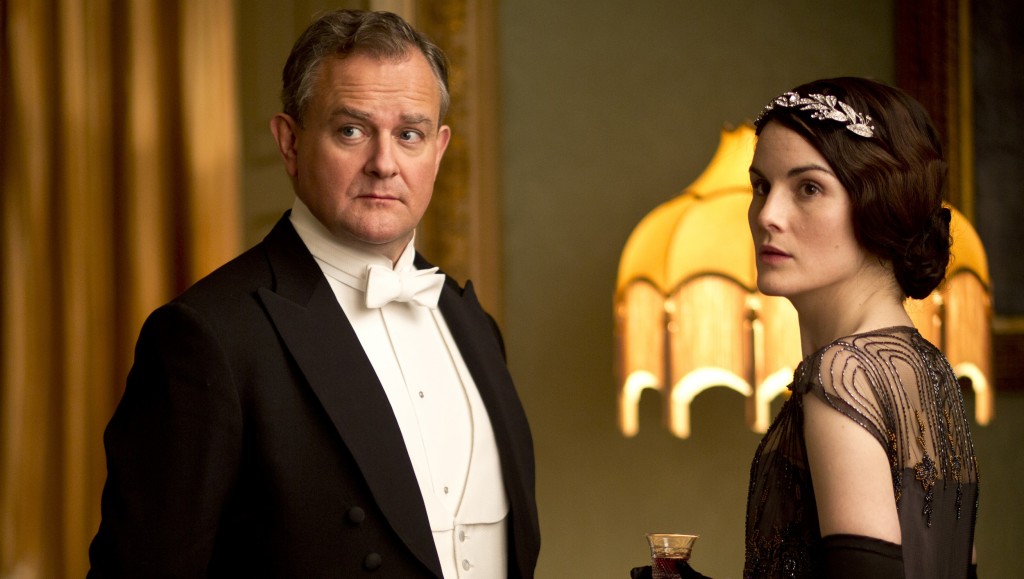
Lord Grantham (Hugh Bonneville) and Lady Mary (Michelle Dockery) ©2013 Carnival Films
In the meantime, Bonneville is praying for the reopening of the theatres. A patron of the excellent Primary Shakespeare Company which brings Shakespeare plays to primary schools, he has missed live performance. “I’ve really physically felt the need to be amongst other people, not just amongst friends, but also the collective experience of either being in a cinema or a concert hall or a theatre.”
He is clinging on to signs of hope. “When there was an easing back last autumn, Chichester, my local theatre, did open up a bit and we did some open-air stuff. You could feel the excitement and the connectivity between people. We are social animals. Let’s keep our fingers crossed. If we can just get through this next few months, with a vaccinated population, we can begin to hold hands again.”
Still, he adds, we’re not out of it yet. “There are going to be some horrible Darwinian moments. I feel for anyone who’s trying to maintain an arts organisation. But we are phoenix-like. The arts have always survived through adversity. There are parallels with Shakespeare in the plague years. His theatre was shut and open and shut and open, and we’re going through that again now. But we will bounce back, and the writing will be juicier and richer and the performances more passionate than ever.”
Bonneville closes by pointing to the echoes of our current plight in To Olivia. “These two characters emerge at the end of the film with a great sense of positivity, albeit in dark and straitened circumstances. I think it’s very helpful for an audience to actually see that there are ways through these horrendous waves of pain and physical and mental agony. It will ease with time. The challenge is to find the patience and the inner strength to navigate that. But I think this film does indicate that there is a path through.”
There is a future for us, then, even if we don’t all end up writing Charlie and the Chocolate Factory?
“Yes,” Bonneville deadpans. “We may just end up eating chocolate.”
‘To Olivia’ is on Sky Cinema from Friday 19 February

